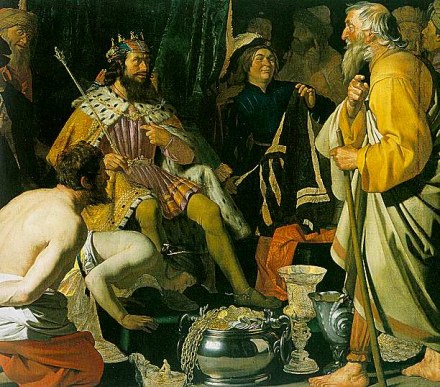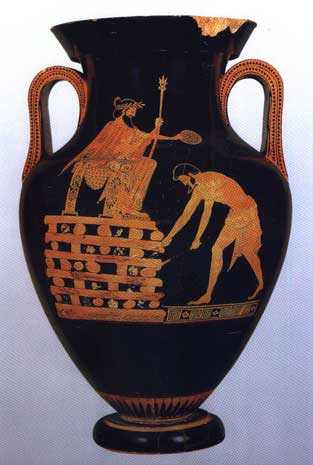The saying “As rich as Croesus” may have become outdated but it truly is a wonder why!
Croesus was the magnificently wealthy ruler of the Lydian Kingdom during the middle of the sixth century B.C. His extravagant riches made him famous, but even he could not escape hubris, destroying his own kingdom and forcibly joining the ambitious Persian Empire around 547 B.C. Years later, Herodotus would recount his follies while Pausanias would detail the greatness of his gifts at Delphi.
Apart from the Bacchylides, Herodotus recounts three distinct episodes in his Histories. Xenophon, on the other hand, places Croesus, or rather, Ctesias, as a prominent character in his fictionalized biography of Cyrus.
Herodotus is the one to whom great credit is given for better knowing Croesus. He says that the Lydian basileus (king) was frienly with the Athenians; indeed, he served as a last support against the Persians who were in nearby Anatolia. In the first of Herodotus’ accounts, Solon, the Athenian lawgiver and sage, comes to Croesus during his travels. Croesus, believing himself to be the most content and fortunate individual in the world, inquires Solon who the happiest person is. Solon responds that Tellus the Athenian who fought and died for his country and was fortunate to see his children’s children who were all alive and well before he died, was the most fortunate. Again, Croesus questions who the second happiest man is, to which Solon replies that the brothers Kleobis and Biton were. Croesus is infuriated to know that he is not among these names and send Solon away; before Solon leaves, he explains that fortune is fickle and no one can judge a person’s happiness or luck until that person has lived his entire life and passed on to the next. Shortly afterwards, Herodotus details the second account where Adrastus, the Athenian statesman, comes to Lydia, asking to be purified and given permission to remain. The reader learns that he has exiled himself for mistakenly killing his brother. Croesus accepts him into his court and treats him kindly. Previously, however, Croesus had had a dream in which his son was killed, so he married him off and protected him as best as possible. Elsewhere, a wild boar had begun to destroy crops so Croesus was asked to send Atys to aid the villagers. After much pleading, Atys was allowed to go but Adrastus was ordered to accompany him. During the hunt, Adrastus accidentally stabbed Atys to death and consequently, committed suicide as a result. Solon’s words echoed in Croesus’ mind. The last story describes Croesus’ preparations against the Persian Cyrus. Sending a great magnitude of gifts to Delphi, Croesus asked the oracle to provide him with a reading about the upcoming war. The oracle ambiguously told him that a great empire would fall; little did Croesus know that the oracle was describing the Lydian Empire. Cyrus attacked when Croesus had sent off his troops for the winter and imprisoned him. After setting Croesus atop a pyre, Cyrus ordered the pyre to be lighted. Croesus finally understood the meaning of Solon’s words and muttered his name, causing Cyrus to realize that they were very similar in character. Cyrus ordered the flames to be extinguished, but they could not be controlled until a great storm stopped their path, thanks to the prayers of Croesus to Apollo.
Although Croesus’ fate is not clear, one can be sure that he learned that money isn’t everything.


Whitley, James. The Archaeology of Ancient Greece. (New York, 2007). 66-9, 72-3, 153, 192, 224-5, 245-6, 329.
Barbour, Amy L. Selections from Herodotus. (Boston, 1964). 1-6, 49-204.
